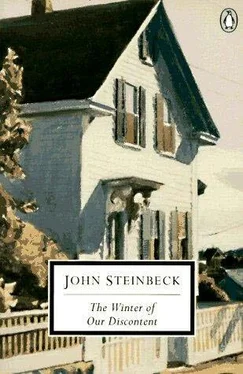John Steinbeck - The Winter of Our Discontent
Здесь есть возможность читать онлайн «John Steinbeck - The Winter of Our Discontent» весь текст электронной книги совершенно бесплатно (целиком полную версию без сокращений). В некоторых случаях можно слушать аудио, скачать через торрент в формате fb2 и присутствует краткое содержание. Жанр: Классическая проза, на английском языке. Описание произведения, (предисловие) а так же отзывы посетителей доступны на портале библиотеки ЛибКат.
- Название:The Winter of Our Discontent
- Автор:
- Жанр:
- Год:неизвестен
- ISBN:нет данных
- Рейтинг книги:5 / 5. Голосов: 1
-
Избранное:Добавить в избранное
- Отзывы:
-
Ваша оценка:
- 100
- 1
- 2
- 3
- 4
- 5
The Winter of Our Discontent: краткое содержание, описание и аннотация
Предлагаем к чтению аннотацию, описание, краткое содержание или предисловие (зависит от того, что написал сам автор книги «The Winter of Our Discontent»). Если вы не нашли необходимую информацию о книге — напишите в комментариях, мы постараемся отыскать её.
The Winter of Our Discontent — читать онлайн бесплатно полную книгу (весь текст) целиком
Ниже представлен текст книги, разбитый по страницам. Система сохранения места последней прочитанной страницы, позволяет с удобством читать онлайн бесплатно книгу «The Winter of Our Discontent», без необходимости каждый раз заново искать на чём Вы остановились. Поставьте закладку, и сможете в любой момент перейти на страницу, на которой закончили чтение.
Интервал:
Закладка:
This night I forced him. I lay straight and rigid, far over on my side of the bed. I tightened every muscle of my body, particularly my neck and jaw, and doubled my fists on my belly and I forced him, bleak little eyes, white spiky mustache, and the forward-curving shoulders that proved he had once been a powerful man of his body and had used it. I even made him put on the blue cap with the short shiny visor and the gold H contrived of two anchors, the cap he hardly ever wore. The old boy was reluctant, but I made him come and I set him on the crumbling sea wall of Old Harbor near the Place. I sat him firmly on a heap of ballast stone and fixed his cupped hands on the head of the narwhal cane. That cane could have knocked over an elephant.
“I need something to hate. Being sorry and understanding—that’s pap. I’m looking for a real hate to take the heat off.”
Memory’s a spawner. Start with one clear detailed print, and it springs into action and it can go forward or back like a film, once it starts.
Old Cap’n moved. He pointed with his cane. “Line the third rock beyond the breakwater with the tip of Porty Point at high water, then out that line half a cable-length she lies, what’s left of her.”
“How far is half a cable-length, sir?”
“How far? Why, half a hundred fathom, of course. She was anchored to swing and the tide flowing. Two bad-luck years. Half the oil casks empty. I was ashore when she caught fire, about midnight. When the oil fired she lit the town like midday and flames running on the oil slick as far as Osprey Point. Couldn’t beach her for fear of burning the docks. She burned to the water in an hour. Her keel and false keel are down there now—and sound. Shelter Island virgin oak they were, and her knees too.”
“How’d it start?”
“I never thought it started. I was ashore.”
“Who’d want to burn her?”
“Why, her owners.”
“You owned her.”
“I was half-owner. I couldn’t burn a ship. I’d like to see those timbers—like to see what shape they’re in.”
“You can go now, Cap’n, sir.”
“That’s slim fare to hate on.”
“It’s better than nothing. I’ll get that keel up—soon as I’m rich. I’ll do that for you—line the third rock with Porty Point at high water, fifty fathoms out.” I was not sleeping. My fists and forearms were rigid and pressed against my stomach to prevent old Cap’n from fading, but when I let him go, sleep lapped over me.
When Pharaoh had a dream he called in the experts and they told him how it was and would be in the kingdom, and that was right because he was the kingdom. When some of us have a dream, we take it to an expert and he tells us how it is in the country of ourselves. I had a dream that didn’t need an expert. Like most modern people, I don’t believe in prophecy or magic and then spend half my time practicing it.
In the springtime Allen, feeling low and lonely, announced that he was an atheist to punish God and his parents. I told him not to go out on a limb or he wouldn’t have leeway to not walk under ladders and cancel black cats with spit and thumb and wish on the new moon.
People who are most afraid of their dreams convince themselves they don’t dream at all. I can explain my dream easily enough, but that doesn’t make it any less frightening.
An order came through from Danny, I don’t know how. He was going away by aircraft and he wanted certain things of me, things I had to make myself. He wanted a cap for Mary. It had to be of dark brown sueded lambskin with the wool on the inside. It had to be of skin like an old pair of sheep-lined slippers I have, had to be like a baseball cap with a long beak. Also he wanted a wind gauge—not the little whirling metal cups but handmade from the thin, stiff cardboard of government postcards, mounted on strips of bamboo. And he called me to meet him before he took off. I carried old Cap’n’s narwhal stick with me. It stands in the elephant’s-foot umbrella stand in our hall.
When we got the elephant’s foot as a present I looked at the big ivory-colored toenails. I told my children, “The first kid who puts nail polish on those toenails gets clobbered—understand?” They obeyed me, so I had to paint them myself—bright red fingernail enamel from Mary’s harem table.
I went to meet Danny in Marullo’s Pontiac and the airport was the New Baytown post office. When I parked I laid the twisted stick on the back seat and two mean-looking cops in a squad car drove up and said, “Not on the seat.”
“Is it against the law?”
“So you want to be a wise guy!”
“No. I was just asking.”
“Well, don’t put it on the seat.”
Danny was in the back of the post office, sorting packages. He was wearing the lambskin cap and whirling the cardboard wind gauge. His face was thin and his lips very chapped but his hands were swollen like hot-water bottles, as though they had been wasp-stung.
He stood up to shake hands and my right hand was folded in the warm, rubbery mass. He put something in my hand, something small and heavy and cool, about the size of a key but not a key—a shape, a metal thing that felt sharp-edged and polished. I don’t know what it was because I didn’t look at it, I only felt it. I leaned near and kissed him on the mouth and with my lips felt his dry lips all chapped and rough. I awakened then, shaken and cold. The dawn had come. I could see the lake but not the cow standing in it, and I could still feel the chapped dry lips. I got up instantly because I didn’t want to lie there thinking about it. I didn’t make coffee but I went to the elephant’s foot and saw that the wicked club called a cane was still there.
It was the throbbing time of dawn, and hot and humid, for the morning wind had not started to blow. The street was gray and silver and the sidewalk greasy with the deposit of humanity. The Foremaster coffee shop wasn’t open, but I didn’t want coffee anyway. I went through the alley and opened my back door—looked in the front and saw the leather hatbox behind the counter. I opened a coffee can, poured the coffee in the garbage pail. Then I punched two holes in a can of condensed milk and squirted it into the coffee can, propped the back door open, and put the can in the entrance. The cat was in the alley all right, but he wouldn’t come to the milk until I went into the front of the store. From there I could see him, gray cat in gray alley, lapping the milk. When he raised his head he was mustached with milk. He sat down and wiped his mouth and licked his pads.
I opened the hatbox and took out the Saturday receipts, all listed and held together with paper clips. From the brown bank envelope I removed thirty one-hundred-dollar bills and replaced the other twenty of them. This three thousand dollars would be my margin of safety until the store’s economy could balance. Mary’s other two thousand would go back to her account and, as soon as I could do it safely, I would replace the three thousand. The thirty bills I put in my new wallet, which made it very fat in my hip pocket. Then I brought cases and cartons from the storeroom, ripped and tore them open, and began to replenish my exhausted shelves, while on a strip of wrapping paper I listed the goods that had to be reordered. Cartons and boxes I piled in the alley for the collection truck, and I refilled the coffeecan with milk but the cat did not return. Either he had had enough or he took pleasure only in what he could steal.
It must be that there are years unlike other years, as different in climate and direction and mood as one day can be from another day. This year of 1960 was a year of change, a year when secret fears come into the open, when discontent stops being dormant and changes gradually to anger. It wasn’t only in me or in New Baytown. Presidential nominations [71] Presidential nominations: The Democratic National Convention met at the Los Angeles Memorial Sports Arena, July 11-15, 1960, and nominated John F. Kennedy for president and Lyndon B. Johnson for vice president. The Republican National Convention met at Chicago’s International Amphitheater, July 25-28, 1960, and nominated Richard M. Nixon for president and Henry Cabot Lodge for vice president.
would be coming up soon and in the air the discontent was changing to anger and the excitement anger brings. And it wasn’t only the nation; the whole world stirred with restlessness and uneasiness as discontent moved to anger and anger tried to find an outlet in action, any action so long as it was violent—Africa, Cuba, South America, Europe, Asia, the Near East, all restless as horses at the barrier.
Интервал:
Закладка:
Похожие книги на «The Winter of Our Discontent»
Представляем Вашему вниманию похожие книги на «The Winter of Our Discontent» списком для выбора. Мы отобрали схожую по названию и смыслу литературу в надежде предоставить читателям больше вариантов отыскать новые, интересные, ещё непрочитанные произведения.
Обсуждение, отзывы о книге «The Winter of Our Discontent» и просто собственные мнения читателей. Оставьте ваши комментарии, напишите, что Вы думаете о произведении, его смысле или главных героях. Укажите что конкретно понравилось, а что нет, и почему Вы так считаете.











